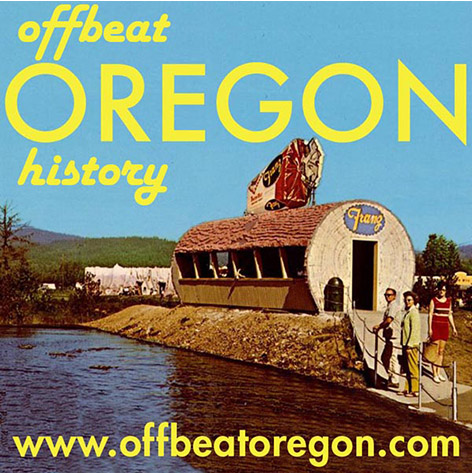By Finn J.D. John
December 1, 2013
This article is Part One of a two-part series on Edouard Chambreau. Part 2 is here.
IN ITS EARLY years, Oregon was at the outer limits of the known world, and that remoteness attracted all sorts of interesting characters. There were Joe Meek types, driven by a spirit of adventure; there were guys like William Ladd, who came hoping to get in on the ground floor and become the next generation of business barons; and, of course, there were the Marcus Whitmans and Jason Lees, the state’s spiritual forefathers, come into the wilderness to save souls.
But there was another kind of frontier Oregon character, too, to whom the remoteness of Oregon appealed: The criminal, looking to run away to a place where memories are short and laws are new and weak.
History has recorded plenty about the successful, hardworking folks who would, a few decades later, become Oregon’s gentry. But history was mostly written by members of that gentry, people who wanted to cast Oregon in a positive, glorious light. The last thing they wanted to write about was what was going on in seedy saloons in places like Portland’s North End “Whitechapel” district, or the brothels and “cribs” of the Second Street “Court of Death.”
Which is why the writings and recollections of Edouard Chambreau are so valuable. Chambreau, in middle age, wrote a long and heartfelt memoir as a sort of confessional – hoping by his example to turn future young men away from the path he had trodden for the previous 40 years. In his youth, he had been an itinerant swindler, gambler, gunfighter and liquor peddler, one of the most scurrilous rascals in all the Oregon territory. Then, in his later years, he became one of its most earnest and effective reformers.
It was, one has to admit, an interesting story. And it sheds much light on the seedy underbelly of the frontier communities of the Oregon Country.
Not cut out to be a tailor
CHAMBREAU WAS BORN in France in 1821, and moved with his family to Montreal in 1825. His parents had hoped he’d become a tailor, but he hated the work, and in 1838, at age 17, he ran away to join the circus.
He spent the following decade or so in circuses and blackface-minstrel troupes, and it was there that he learned the skills that he’d bring to bear so effectively on the Oregon frontier: fighting to win, cheating at cards and dice, and making money the old fashioned way – by swindling people.
He spent a little time in the Army of the West, fighting in the Mexican-American War, and it’s that enterprise that brought him to Oregon for the first time, in 1847.
The Oregon Territory would never be the same.
Almost immediately upon arriving, Chambreau connected with William Johnson, the Oregon country’s first bootlegger, who was secretly distilling a nasty substance called Blue Ruin out of flour-mill leftovers and selling it to the local Native Americans (here's a link to the full story of that venture). (Oregon was under Prohibition at that time – Johnson’s Blue Ruin enterprise had inspired the first Prohibition law in American history. It wouldn’t be repealed until 1849.)
In the gold fields
THE NEXT YEAR, Chambreau was in a Hudson’s Bay Company prison in Fort Vancouver when he got word of the discovery of gold in California, and he immediately knew he had to go. With the help of some friends, he broke out and fled southward to the gold fields.
But not to look for gold – at least, not directly. Although he got in very nearly on the ground floor in the gold fields, it seems never to have occurred to him to try his luck as a miner. No, Chambreau’s plan was to let the miners get the gold, and then swindle them out of it at rigged games of chance.
Hounded out of San Francisco
IN SAN FRANCISCO, Chambreau settled in with a pack of his friends from the Army of the West – including James Lappeus, who would become the first Portland Chief of Police twenty years later. The group of them formed themselves into a gang, dubbed themselves “The Hounds,” and got busy terrorizing the frontier citizens of the future City by the Bay, running a sort of protection racket there.
Then one night, Chambreau and fellow Hound Jim Beatty got into a shootout with a group of Mexican miners. When the smoke had cleared, Beatty was dead, and the Hounds decided some retribution was in order.
[EDITOR'S NOTE: In "reader view" some phone browsers truncate the story here, algorithmically "assuming" that the second column is advertising. (Most browsers do not recognize this page as mobile-device-friendly; it is designed to be browsed on any device without reflowing, by taking advantage of the "double-tap-to-zoom" function.) If the story ends here on your device, you may have to exit "reader view" (sometimes labeled "Make This Page Mobile Friendly Mode") to continue reading. We apologize for the inconvenience.]
—(Jump to top of next column)—
| 

